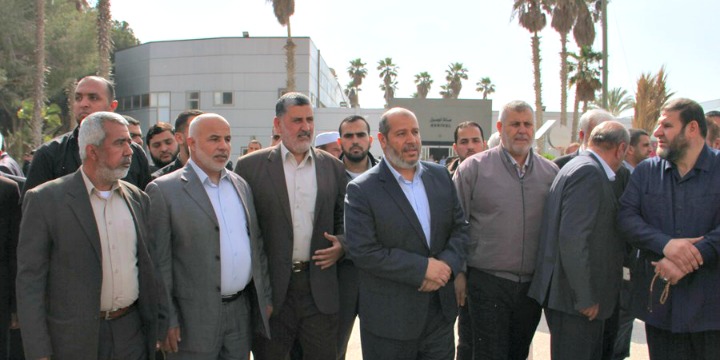Hamas Is in the Cold
 by Eyal Zisser / Israel Hayom / JNS.org
by Eyal Zisser / Israel Hayom / JNS.org

Hamas leaders in Gaza awaiting the body of Dr Fadi al-Batsh at the Rafah crossing, Apr. 26, 2018. Photo: moi.gov.ps.
JNS.org – As per convention, Egypt’s Foreign Ministry this week made sure to condemn Israel. Behind the scenes, however, the real story was apparently unfolding — an Egyptian push to end the madness and stop the cycle of violence that Hamas wants to impose on the entire region.
The Egyptians have never hidden their views on Hamas or its allies — Turkey and Qatar — whom they have considered enemies, and still do. With no other choice, they were willing to accept Hamas’ rule in Gaza, but their patience expired when it became clear that the terror organization was playing with fire, supported by a tailwind from Turkish President Recep Tayyip Erdogan.
Eleven years have passed since Hamas seized control of the Gaza Strip, and its situation has never been worse. It has failed to adequately manage the daily lives of Gazans. The path of armed struggle was choked off after Israel found a solution to the missile threat (Iron Dome), and no less important — the threat of underground terror tunnels. Finally, Hamas’ diplomatic escape routes were blocked once Egyptian President Abdel-Fattah el-Sissi entered office.
To escape this fate, Hamas chose, perhaps like Samson pulling the temple down upon himself and the Philistines, a path of suicidal destruction. Primarily, it has sought to create a mass casualty media event to strike at hearts and minds — hopefully while inflicting Israeli casualties — to divert the world’s attention to Gaza, and force Israel and Egypt to ease some of the pressure suffocating the group.
However, the events along the Israel-Gaza border have not only failed to advance Hamas’ interests, or the Palestinian cause, for that matter — but they have knocked the terrorist group yet another step backward.
Countries like South Africa and Turkey are predictably condemning Israel. The US, on the other hand, which is still the leading global superpower, is standing firmly and decisively behind Israel — in fact, to an unprecedented degree. Meanwhile, the majority of Arab countries are standing with Washington in the more important fight — against Iran and its proxies, such as Hamas and Hezbollah.
All of this points to a new regional alignment spearheaded by the United States, in which Israel and moderate Arab countries are partners. Its effects can already be seen in the efforts to restrain Hamas and block Iran. Turkey and several European countries are choosing, as per usual, to oppose the US and Israel. Emerging before us is a clash between the new world that Washington wants to advance, and the old, nefarious world.
As for Hamas, its swelling distress could lead it to further escalate the process it initiated, perhaps even reverting to shooting missiles at Israel. Either way, Israel should now re-examine its Gaza policies, which are predicated on a willingness to accept Hamas’ ongoing rule as the lesser of two evils. In this regard, Israel will find itself in line with several important Arab countries, among them Egypt and Saudi Arabia, who also want to extinguish the fire in Gaza, get rid of Hamas if possible, and focus — primarily — on Iran.
Eyal Zisser is a lecturer in the Middle East History Department at Tel Aviv University.
 Police Stop Anti-Zionist Agitators From Accessing Florida University President’s Home as Students Revolt Nationwide
Police Stop Anti-Zionist Agitators From Accessing Florida University President’s Home as Students Revolt Nationwide Nearly One in Five Young People Sympathize With Hamas, 29% Say US Should Reduce or End Alliance With Israel: Poll
Nearly One in Five Young People Sympathize With Hamas, 29% Say US Should Reduce or End Alliance With Israel: Poll Ilhan Omar Silent After Daughter’s Arrest, Suspension for Role in Columbia University Anti-Israel Protest
Ilhan Omar Silent After Daughter’s Arrest, Suspension for Role in Columbia University Anti-Israel Protest Cultural Center Backed by Iran’s Revolutionary Guard Plans to Produce Films About Attack on Israel
Cultural Center Backed by Iran’s Revolutionary Guard Plans to Produce Films About Attack on Israel How Does Ilhan Omar Really Feel About Iran?
How Does Ilhan Omar Really Feel About Iran? This Passover, Combine Respect for Tradition with the Courage to Innovate
This Passover, Combine Respect for Tradition with the Courage to Innovate Israel’s Iran Attack Carefully Calibrated After Internal Splits, US Pressure
Israel’s Iran Attack Carefully Calibrated After Internal Splits, US Pressure Palestinian Cameramen Exposed in New Footage Documenting Oct. 7 Atrocities Side by Side with Terrorists
Palestinian Cameramen Exposed in New Footage Documenting Oct. 7 Atrocities Side by Side with Terrorists US Money to Convicted Terrorists; US Training to Aspiring Terrorists
US Money to Convicted Terrorists; US Training to Aspiring Terrorists Man Arrested in Paris After Iran Consulate Incident
Man Arrested in Paris After Iran Consulate Incident



 Nearly One in Five Young People Sympathize With Hamas, 29% Say US Should Reduce or End Alliance With Israel: Poll
Nearly One in Five Young People Sympathize With Hamas, 29% Say US Should Reduce or End Alliance With Israel: Poll Israeli Government Approves Increased Payments to Returned Gaza Hostages
Israeli Government Approves Increased Payments to Returned Gaza Hostages Police Stop Anti-Zionist Agitators From Accessing Florida University President’s Home as Students Revolt Nationwide
Police Stop Anti-Zionist Agitators From Accessing Florida University President’s Home as Students Revolt Nationwide Amazon Pulls Book by Hamas Leader Yahya Sinwar Referencing Oct. 7 Attacks After UK Lawyers Intervene
Amazon Pulls Book by Hamas Leader Yahya Sinwar Referencing Oct. 7 Attacks After UK Lawyers Intervene Man Arrested in Paris After Iran Consulate Incident
Man Arrested in Paris After Iran Consulate Incident